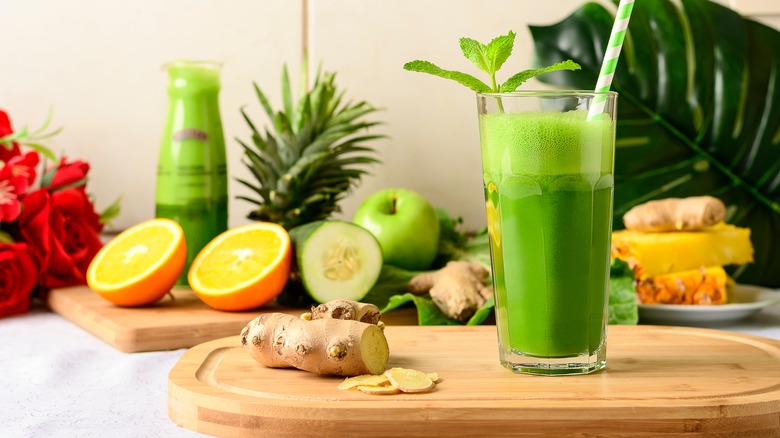The One Type Of Juice You Should Never Drink After The Expiration Date Has Passed
When it comes to hydrating and refreshing the palate, there are times when a simple glass of water simply doesn't cut it. When only something sweet, tart, and fruity will do the trick, juice is the obvious solution.
Like most food products, store-bought juices are usually adorned with expiration dates, as per American state food distribution standards. Some consumers follow these dates religiously, but others are a little more sparing. The truth is, the dates printed on the packaging usually do not have to do with the lifetime of the products and when they're no longer safe to consume. Rather, they're meant for retailers to know when they should stop selling the products.
When it comes to juices, it's generally okay to keep most of them around a few days later than the printed date. But you'd be much safer tossing one particular type as soon as that date arrives.
You'd be hard-pressed to find a long-lasting cold-pressed juice
The safety of juice has less to do with the specific fruits or vegetables and more to do with the juicing process. And cold-pressed juices should not be consumed after they pass their expiration dates.
The cold-pressed juicing process is an alternative to the industrial juicing process; the juice is extracted by hydraulic presses rather than by a traditional centrifugal extractor. This process helps preserve the nutrients that are naturally found in the pressed fruits.
The problem is that pasteurization is part of those traditional heating methods. Pasteurization is a heat treatment for products prone to contamination by disease-causing bacteria. This treatment is almost always applied to the juice and cow's milk varieties sold at grocery stores. Pasteurizing these products not only extends their lives in the fridge but also decreases the likelihood that their consumers contract food-borne illnesses. Cold-pressing is a pasteurization-free process, which makes the likelihood of contamination in the juice product much higher.
The case for cold-pressed juice
This is not to say that cold-pressed juices should be avoided at all costs. Freshly made, cold-pressed juices are full of benefits that are hard to find in industrially made juices. Cold-pressed juices retain all of the vitamins, minerals, and antioxidants that fruits and vegetables have to offer. On top of their denser nutrient contents, the flavors in cold-pressed juices are simply fresher — as lively and potent as the fruits and vegetables themselves.
If you opt for cold-pressed juice, it's recommended that you drink it within two to three days of buying it and keep it refrigerated during that time.
Whether you prefer it from a juice box or a bottle, straight up or mixed in a cocktail, apple or orange, cold-pressed or heated, juice is one of those simple pleasures that rarely loses its appeal as time goes by. Don't be afraid to enjoy at as you like it, but consider the pros and cons of both juice types.


